November 6-8, 2024 at MTRI in Ann Arbor, MI
Participant Registration Closes November 4: https://forms.gle/C5PgpbyVcHUfPwnq7
Join us for a collaborative workshop about the common challenges and new frontiers combining science with computing and AI!
Objectives:
- Identify common features of best-in-class AI/ML methods for science
- Characterize approaches for rigorous investigation into complex systems and associated science problems
- Explore engineered systems and the integration of AI into said systems, as well as what this tells us about engineering AI systems
Speakers (Alphabetical):
- Allan Avila (AIMdyn, Inc.)
Spectral Operator Methods for Learning Dynamical Systems - Paul Bendich (Geometric Data Analytics and Duke University)
Shape-based Mathematics at the service of Deep Learning, with applications to AI Safety and Efficient Reinforcement Learning - Joshua Bloom (UC Berkeley)
AI in Astrophysics - Carl Edwards (University of Illinois Urbana-Champaign)
NLP for Scientific Discovery in Chemistry and Biomedicine - Santo Fortunato (Indiana University, Bloomington)
AI in networks and the science of science (provisional) - Felix Herrmann (Georgia Institute of Technology)
Digital Twins in the era of generative AI — Application to Geological CO2 Storage - Bethany Lusch (Argonne National Laboratory)
AI for Science and Engineering at the Supercomputing Scale - Ryan McGranaghan (NASA-JPL)
TBD - Raphaël Pestourie (Georgia Institute of Technology)
Scientific Machine Learning for Optimization via Surrogate Models (provisional) - David Roy (Michigan State University)
Artificial Intelligence for high spatial resolution satellite fire monitoring - Steve Techtmann (Michigan Technological University)
Applications of Machine Learning and Microbial Communities for Environmental Monitoring - Lingfei Wu (University of Pittsburgh)
AI for Team Science
Representative Breakout Topics:
- What research areas are still confronted with "too little data" in the era of "too much data"?
- What lessons have we learned about the ways current AI methods FAIL to meet STEM needs?
- What metrics adequately quantify uncertainty in AI output for STEM research purposes?
- How are STEM fields leveraging AI to improve human understanding of complex and previously intractable research problems?
- Is there an inevitable emerging role for interdisciplinary research between computing/computer science and other STEM fields?
Schedule (tentative):
Day 1 (Wednesday, November 6th)
| Time | Activity |
| 9am-12:00pm | Arrival |
| 12pm-1pm | Check-in at MTRI |
| 1pm-1:45pm | Kitchen |
| 1:45pm-2:30pm | McGranaghan |
| 2:3pm-2:45pm | Break |
| 2:45pm-3:30pm | Lusch |
| 3:30pm-4:15pm | Bendich |
| 4:15pm-4:30pm | Break |
| 4pm-5pm | Group Discussion |
| From 5pm | Recommended: Dinner Downtown |
Day 2 (Thursday, November 7th)
| Time | Activity |
| 9am-9:45am |
Edwards |
| 9:45am-10:30am |
Techtmann |
| 10:30am-10:45am | Break |
| 10:45am-11:30am | Hermann |
| 11:30am-12:30pm | Breakout 1 |
| 12:30pm-1:30pm | Lunch |
| 1:30pm-2pm | Bloom |
| 2pm-2:45pm | Fortunato |
| 2:45pm-3pm | Break |
| 3pm-4pm | Breakout 2 |
| 4pm-5pm | Group Discussion |
| From 5pm | Recommended: Happy Hour at Rappourt |
Day 3 (Friday, November 8th)
| Time | Activity |
| 9am-9:45am |
Pestourie |
| 9:45am-10:30am | Avila |
| 10:30am-10:45am | Break |
| 10:45am-11:30am | Roy |
| 11:30am-12:15pm | Wu |
| 12:15pm-1:15pm | Lunch |
| 1:15pm-2:30pm | Breakout 3 |
| 2:30pm-3:30pm | Group Discussion |
| 3:30pm | Depart |
Travel Information:
- MTRI
3600 Green Ct STE 100, Ann Arbor, MI 48105
Accommodations
Directions from DTW
Things to Do: Main Street Ann Arbor
Organizer: S. Kitchen, snkitche@mtu.edu
